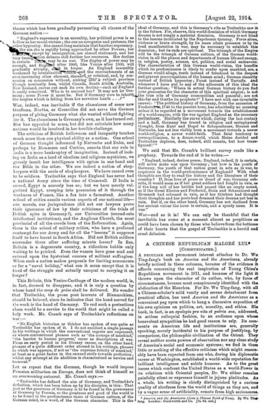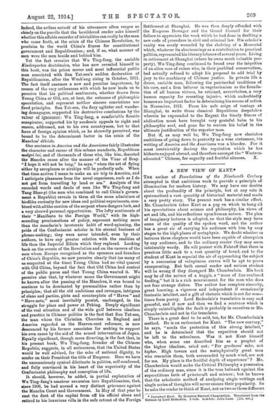A CHINESE REPUBLICAN MALGRE LIM*
[COMMUNICATED.]
A PECULIAR and permanent interest attaches to Dr. Wn Ting-fang's book on America and the Americans, already briefly noticed in these columns, because of the evidence it affords concerning the real inspiration of Young China's Republican movement in 1911, and because of the light it throws upon the character of its author, who, by force of circumstances, became most conspicuously identified with the abdication of the Manchus. For Dr. Wu Ting-fang, with all a Chinese scholar's mild vanity and serene detachment from practical affairs, has used America and the Americans as a convenient peg upon which to hang a discursive exposition of his own opinions on politics, art, morality, and ethics. Eli book, in fact, is an apologia pro vita et patria sua, addressed, in artless colloquial fashion, to an audience upon whose benevolent sympathies he had good reason to rely. Its com- ments on American life and institutions are, generally speaking, merely incidental to his purpose of justifying, by comparison, the philosophic civilization of the Orient. They reveal neither acute powers of observation nor any close study of America's social and economic systems; we find in them little or nothing of the effective criticism which might reason- ably have been expected from one who, during his diplomatic career at Washington, established a world-wide reputation for brilliant intelligence and subtle humour. As to the great issues which confront the United States as a world-Power in its relations with Oriental peoples, Dr. Wu either remains painfully silent or expresses himself in jejune platitudes. As a whole, his writing is chiefly distinguished by a curious quality of aloofness from the world of things as they are, and by a vague sense of artificiality, remote from high seriousness.
• America and the Americans (from a Chinese Point of View). By Wu Tin.. fang. London: Duckworth and Co. Us. 6d. net.)
Indeed, the artless naiveté of his utterances often verges so clOsely on the puerile that the bewildered reader asks himself whether this affable recorder of trivialities can really be the man who came forth, at the crisis of the Chinese Revolution, to proclaim to the world China's fitness for constitutional government and Republicanism ; and, if so, what manner of men were the men beside and behind him.
Yet the fact remains that Wu Ting-fang, the amiable Kindergarten doctrinaire, who has now revealed himself in this book, was the prime mover and most influential public man associated with Sun Yat-sen's sudden declaration of Republicanism, after the Wuch'ang rising in October, 1911. The fact itself assumes a new and peculiar importance, by reason of the very artlessness with which he now leads us to perceive that his political sentiments, whether drawn from Young China or Old, are, at best, the outcome of philosophic speculation, and represent neither sincere convictions nor fixed principles. Sun Yat-sen, the fiery agitator and wander- ing demagogue, supported his destructive conclusions by the valour of ignorance: Wu Ting-fang, a comfortable fireside conspirator, supported his by academic appeals to right and reason, addressed, not to his own countrymen, but to that force of foreign opinion which, as he shrewdly perceived, was bound to be the determinant factor in the crisis of the Manchus' debacle.
One sentence in America and the Americans fairly illustrates the character and career of this urbane mandarin, Republican malgre lui, and of thousands of those who, like him, deserted the Manchu cause after the manner of the Vicar of Bray. "I hope it will not be long," be says, " when the art of flying either by aeroplanes or airships will be perfectly safe. When that time arrives I mean to make an air trip to America, and I anticipate pleasures from the novel experience, such as I do not get from travelling by land or sea." Analysis of the recorded words and deeds of men like Wu Ting-fang and Tang Shao-yi (the men who combined to call China's govern- ment a Republic) reveals in them all the same admixture of birdlike curiosity for new ideas and political experiments, com- bined with all the caution of the serpent where dangers lurk, and a very shrewd personal opportunism. The lofty sentiments of their " Manifesto to the Foreign World," with its high- sounding proclamations of policy, represent nothing more than the mandarin's inveterate habit of word-spinning, the pride of the Confucianist scholar in his eternal business of phrase-making ; they were never intended, even by their authors, to have any greater relation with the realities of life than the Imperial Edicts which they replaced. Looking back on the events of the Revolution and on the careers of the men whom Europe recognized as the sponsors and founders of China's Republic, we now perceive clearly that (as many of us suspected at the time) Young China had no vital quarrel with Old China, beyond the fact that Old China had control of the public purse and that Young China wanted it. We perceive also that, by whatever name the Government might be known after the passing of the Manchus, it was bound to continue to be dominated by personalities rather than by principles; that all the old ambitions and revenges, intrigues of clans and parties, plots and counterplots of " Haves " and "Have-nots," must inevitably persist, unchanged, in the struggle for place and power at Peking. Deeply significant of the real situation and of the wide gulf between idealism and practice in Chinese politics is the fact that Sun Yat-sen, the man whom the Christian Churches in England and America regarded as the Heaven-sent reformer, is now denounced by his former associates for seeking to support his own cause by the aid of the armed intervention of Japan. Equally significant, though more diverting, is the fact that, in his present book, Wu Ting-fang, founder of the Chinese Republic; suggests, in all seriousness, that the 'United States would be well advised, for the sake of national dignity, to confer on their President the title of Emperor. Here we have the unconsciously cynical dilettante in politics, self-confessed, and fully convinced in his heart of the superiority of the Confucianist philosophy and conception of life.
It should, however, be added, in partial explanation of Wu Ting-fang's amateur excursion into Republicanism, that, since 1906, he had nursed a very distinct grievance against the Manchu Court and Government. In May of that year he east the dust of the capital from off his official shoes and retired to his luxurious villa in the safe retreat of the Foreign Settlement at Shanghai. He was then deeply offended with the Empress Dowager and the Grand Council for their failure to appreciate the work which he had done in drafting a new code of procedure in civil and criminal law. His scholar's vanity was sorely wounded by the shelving of a Memorial which, whatever its shortcomings as a contribution to practical polities, represented his literary labours of several years. Living in retirement at Shanghai (where he owns much valuable pro- perty), Wu Ting-fang continued to brood over the iniquities of an alien race of rulers who, in their purblind conservatism, had actually refused to adopt his proposal to add trial by jury to the machinery of Chinese justice. In private life a douce, amiable man, following the patriarchal traditions of his race, and a firm believer in vegetarianism as the founda- tion of all human virtues, he retained, nevertheless, a very human capacity for resenting injuri'", which undoubtedly became an important factor in determining his course of action in November, 1911. From his safe coign of vantage at Shanghai, to write those classical Republican despatches wherein he expounded to the Regent the timely fitness of abdication must have brought very grateful balm to his philosophic soul, and gone far to restore his belief in the ultimate justification of the superior man.
But if, as may well be, Wu Ting-fang now cherishes ambitions of going down to posterity as a wise statesman, his writing of America and the Americans was a blunder. For it must irretrievably destroy the reputation which he has hitherto enjoyed abroad, and therefore amongst the" Western- educated" Chinese, for sagacity and fruitful silences. X.



































 Previous page
Previous page